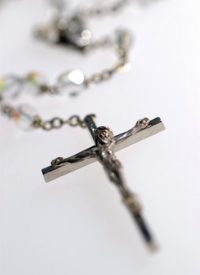
In a statement ACLU spokeswoman Lisa Graybill said that under the “First and Fourteenth Amendments to the U.S. Constitution and Texas’ Religious Freedom Restoration Act, students’ right to wear articles of faith in school is indisputably protected.”
Officials of Brownsville’s Simon Rivera High School assured the usually secular legal watchdog group that it had not ordered students to remove the rosaries, but had merely asked them to make them a little less obvious, noting that the wearing of the Catholic faith symbol has been tied to gang affiliation. In fact, local police chief Oscar Garcia told the Express that students at Rivera had been seen wearing homemade rosary-like accessories around their heads and waists to show off their gang connections.
“Through our intel and the contact that our gang officers have had, and as a matter of fact from what gang members were telling us, these rosaries are symbols to identify their association,” Garcia told the paper. “It’s a thing being brought in by prison gangs. I’ve seen them on the inside of county jails where they’re made, and I once upon a time worked within the penitentiary and the county jail system.”
Drue Brown, spokeswoman for the district, noted that a school policy that has been in place since 1998 prohibits students from wearing “religious symbols which have been altered with the intent of causing offense or inciting or promoting gang activity, violence, or other prohibited behaviors.” Nonetheless, she said, school officials have not forced students to comply, but merely asked them to make their “religious expression” a little less obvious. “Never once did we ever say for students not to wear anything,” she said. “The only thing that was said was, ‘Kids, you know, kind of tuck them under your clothes.’”
The ACLU’s Graybill assured the district that she totally understood “the imperative that school administrators and district personnel have to keep schools safe.” Nonetheless, she added, the school could not “substantially burden a student’s free exercise of religion, which includes wearing an article of faith, like a rosary or a cross or a yarmulke, or long hair for an American Indian student, without a compelling reason.”
The secular group intimated that the school crossed a supposedly constitutional line when it instituted the cautionary measure of asking students to hide their gang symbols. “While the school district has reportedly justified the policy change as necessary to prevent gang activity,” the ACLU explained in a press release, “district officials did not cite any actual evidence of gang activity connected to rosaries or crosses when they issued the policy.” Said the Texas ACLU’s public education director Dotty Griffith: “We support the school district’s critical mandate to keep all children safe at school. However, [its] action in limiting the constitutional rights of all students, absent evidence of an actual threat, would be like sending a colt to the glue factory to keep it from running away.”
Regardless of how the situation is resolved, at least one conservative legal advocacy group has noted the ACLU’s action — whatever the reason — on behalf of “religious expression” and explained the possible reason for the ACLU's out-of-character action. According to Jeff Mateer of the Texas-based Liberty Institute, a conservative legal advocacy group, the organization defending the students is the Texas ACLU, not the national group, an important distinction, he said. “The Texas ACLU has joined with us here in Texas on a few cases, so they seem to be a little more intellectually honest,” said Mateer, offering a backhanded endorsement of the secular group.



